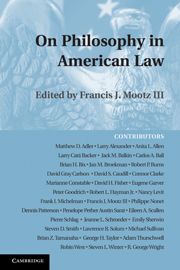Book contents
- Frontmatter
- Contents
- Introduction
- PART I KARL LLEWELLYN AND THE COURSE OF PHILOSOPHY IN AMERICAN LAW
- PART II PHILOSOPHICAL PERSPECTIVES ON LAW
- 7 Toward Normative Jurisprudence
- 8 Critical Legal Theory Today
- 9 Reviving the Subject of Law
- 10 Law and Creativity
- 11 The Stories of American Law
- PART III AREAS OF PHILOSOPHY AND THEIR RELATIONSHIP TO LAW
- PART IV PHILOSOPHICAL EXAMINATIONS OF LEGAL ISSUES
- PART V LAW, RHETORIC, AND PRACTICE THEORY
- PART VI QUESTIONING THE RELATIONSHIP BETWEEN PHILOSOPHY AND AMERICAN LAW
- PART VII COMMENTARIES
- Contributors and Selected Bibliography
- Name Index
- References
10 - Law and Creativity
Published online by Cambridge University Press: 31 July 2009
- Frontmatter
- Contents
- Introduction
- PART I KARL LLEWELLYN AND THE COURSE OF PHILOSOPHY IN AMERICAN LAW
- PART II PHILOSOPHICAL PERSPECTIVES ON LAW
- 7 Toward Normative Jurisprudence
- 8 Critical Legal Theory Today
- 9 Reviving the Subject of Law
- 10 Law and Creativity
- 11 The Stories of American Law
- PART III AREAS OF PHILOSOPHY AND THEIR RELATIONSHIP TO LAW
- PART IV PHILOSOPHICAL EXAMINATIONS OF LEGAL ISSUES
- PART V LAW, RHETORIC, AND PRACTICE THEORY
- PART VI QUESTIONING THE RELATIONSHIP BETWEEN PHILOSOPHY AND AMERICAN LAW
- PART VII COMMENTARIES
- Contributors and Selected Bibliography
- Name Index
- References
Summary
In today's world we face the prospect of rapid change in many areas such as medicine, international trade, information technology, and the use of terror. Innovation is the buzzword in the business world. How able is the law to keep up with these changes?
We can contemplate several types of responses to this question. The first would argue that legal principles can extend to encompass new situations. The principles don't change, but their applications do. A second response would claim that the legal interpretation (whether common law, statutory, or constitutional) changes in a common law fashion: principles are modified, but slowly, incrementally, with a significant attention to the past and precedent. A third response would argue, as for example in a Posnerian pragmatism, for more robust attention to consequences rather than the past and would allow for greater deviation from existing law. A fourth and final response would focus on legal change occurring at the legislative or regulatory levels.
While I regard the first response as insufficient, my concern lies not with which of the latter three is a more accurate or appropriate assessment of the legal system. Instead, I want to probe how philosophy might assist reflection on the nature of legal change at whatever point and in whatever manner such change is deemed appropriate. How does philosophy help us understand how legal creativity occurs?
- Type
- Chapter
- Information
- On Philosophy in American Law , pp. 81 - 87Publisher: Cambridge University PressPrint publication year: 2009
References
- 1
- Cited by



